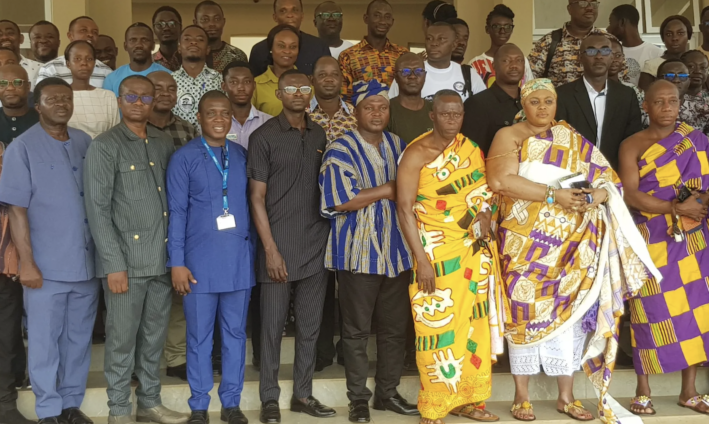Many Ghanaians will experience hunger and malnutrition by 2030 due to anticipated drop in national fish production, Professor Berchie Asiedu, the Dean, School of Natural Resources, University of Energy and Natural Resources (UENR) has hinted.
He said the nation’s fish consumption was expected to reach 888,096 tonnes by 2030; however, total fish production was anticipated to constitute only about 43 per cent of the total fish requirement.
“This clearly shows that demand for fish consumption is expected to outweigh the national supply,” Prof Asiedu explained.
At the current growth rate, per capita fish consumption is predicted to decline from 28 kg in 2018 to 23.9 kg in 2030, Prof Asiedu, stated saying, “fish consumption would increase, but people would be eating less fish.”
Prof Asiedu made this known when speaking on a research update session, organised by the School of Natural Resources of the University in Sunyani on the theme “Managing our Natural Resources: Academia-Industry Partnership for Sustainable National Development.”
The session was attended by natural resources experts.
Prof Asiedu explained that as the cheapest and most consumed animal protein (60 percent) in the country, fish demand had increased rapidly over the past few years, growing from 960,000 tonnes in 2010 to 1.1 million tonnes in 2020.
Within the same period, per capita fish consumption increased from 24.2 kg to 27.9 kg at a rate of 1.6 percent per annum.
Following the gaps in the trends of production and consumption, Prof Asiedu called for an urgent need for policies to accelerate aqua-culture development in the country.
He also underlined the importance of ensuring general improvement in the fisheries management practices, as well as exploration of adaptive strategies and thereby improve the adaptive capacity of fishers to climate change.
Later in an interview, Mr. Hanson Kodzo Dzamefe, the Bono Regional Director of the Fisheries Commission, expressed concern about the nation’s over-reliance on marine fishes, and called for private sector collaboration to develop the nation’s aqua-culture sector.
He said aquaculture had huge potential for job creation and food security, saying the inland fishing value chain could create millions of jobs if investments were put into the sector.
Mr Dzamefe said aquaculture remained a lucrative business, and therefore, called on the unemployed youth and graduates to engage in commercial fish production to better their lots and advance national food security too.
Latest Stories
-
GCB Bank to launch special ‘Hajj Account’ as part of inclusive financial offerings
7 minutes -
GH¢1 fuel levy eight times worse than scrapped E-Levy – Bawumia
13 minutes -
Interior Ministry warns public against fake security services recruitment
23 minutes -
Tanzania announces shutdown of X because of pornography
24 minutes -
Education Minister condemns sexual harassment of female employees, calls for institutional reforms.
28 minutes -
Court orders destruction of $350m cocaine intercepted in Ghana
33 minutes -
Family of late PURC Board Chair pays courtesy call on President ahead of final funeral rites
40 minutes -
Mechanising the cashew economy of Ghana to rake in more profits
1 hour -
Ronaldo fires Portugal into Nations League final with 2-1 win over Germany in Munich
1 hour -
Anass Sabit: Beyond Hajj – My spiritual journey in Mecca reveals Islam’s “lesser” pilgrimage, Umrah
1 hour -
Chelsea sign Ipswich striker Delap in £30m deal
1 hour -
GH₵1 per litre isn’t small money – GPRTU slams gov’t over new fuel levy
2 hours -
Sam George outlines evidence-based plan to reduce mobile data costs
2 hours -
AT Ghana gets Canadian investor, Rektron Group
2 hours -
Mahama to set up inter-ministerial committee to implement economic dialogue recommendations
3 hours

